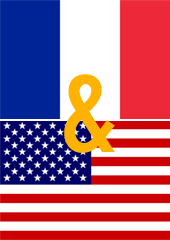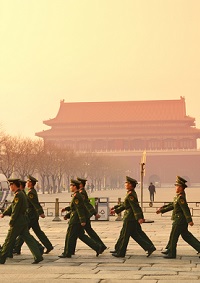France and the United States: The Story of Four Amazing Parallels
Two “grand nations” strangely united in the pursuit of wrong priorities.
February 13, 2014

France is about the last country that most Americans would ever want to be compared to. And, not to miss a beat, the United States is about the last country most French would tolerate being compared to.
And yet, France and the United States share many parallels. In the late 18th century, each emerged as a competing source point of “universal” (Western) liberal democratic values.
But now, in the early 21st century, these parallels are far less illustrious and awe-inspiring. Quite the opposite. Many of the parallels visible today underscore a deep structural crisis which both countries face. I count four parallels that really matter.
1. Omnipotence
The first parallel is the ill-fated belief in the omnipotent powers of the presidential system. True, Francois Hollande has done his utmost to disabuse his fellow citizens of that notion. Still, the French continue to love the idea of having a “king.”
Their collective hope is that this one person can somehow magically fix things for the people, preferably by decree. This penchant for royalism is accompanied by democratic pretenses. The underlying belief is this: The more we protest and resist, the more benefits we can expect.
The Americans, originally born out of an anti-royalist impulse, curiously regret nothing more than not having a king. For all the democratic pretensions of the United States, they share with the French a deep-rooted desire to imagine their president as king. Just watch the decorum of the White House and the length of the presidential motorcade.
Relying on the idea of an omnipotent president is not only profoundly anti-democratic. It is also extremely disempowering. Worse, it hollows out the can-do spirit that is necessary at the popular level to support any meaningful reforms.
In the end, all the pomp and circumstance surrounding the Elysée and the White House prove fatal to achieving real results in the world of politics where the lofty aspirations hit reality.
The French know full well that they only pretend that their president is omnipotent. In exchange, their president pretends that he – so far always a he – can protect them. Magically, he is able to keep all the evils of the world outside their nation’s borders from affecting them in their daily lives.
Donald Trump is the perfect embodiment of that vain and wrong-headed ideology that rests on an excessive mythologization of the nation. In his constant need to demonstrate omnipotence, Trump is actually very 18th century. Even his hairdo is a direct throwback to the wigs of those late feudalist kings.
And in both countries, a complete illusion, if not delusion still reigns supreme. The United States and France share an expectation that it is the world that has to change, rather than their own country.
2. Elitism
The second amazing parallel is that both countries suffer more than most other large economies from extreme elitism. In France, the upper crust has long been far removed from the rest of the people. Yes, they live among them – but, in a very real sense, are always above them.
Moreover, the French elite has always managed to arrange its own business affairs quite well, irrespective of how the national economy does. That is also the case now, as the economy has trouble bouncing back.
The distance between the 1% and the rest is a newer phenomenon in the United States, although there had been an earlier such episode during the 1890s.
The period between the Civil War and 1900, dubbed the “Gilded Age” by none other than Mark Twain, previously was America’s most pronounced age of inequality. The grand mansions in Newport, Rhode Island, are testimonies to the extreme wealth wrought by the immense growth of industry. The desperate poverty of repeated crashes and prolonged deflation during the period have largely faded from collective memory.
The one big difference between France and the United States now is that, in the latter, elites have lost any sense of self-discipline. That is largely the result of the ever-pliable politicians in the U.S. Congress. Their main interest is to serve their financial sponsors at all times.
In France, where the bite of tax policy vis-à-vis the rich is at the other extreme, the separation from the country plays out in a different, more physical fashion. About half of the offspring of the country’s upper crust have literally jumped ship. They are pursuing their lives and careers outside France, often in the UK/London.
3. Standstill at home and action abroad
Let us now turn to a more pedestrian matter, the management of the national economy. For the third amazing parallel is that, at least under their respective current governments, both countries operate on the basis of worshipping standstill, or stasis. For all the huffing and puffing, very little gets actually accomplished. Both political camps in either country mostly excel at blocking each other.
For all the inertia at home, curiously the only times the U.S. and French political systems seem to be united across the aisle is when the cause is intervening abroad, preferably clandestinely, or when fighting domestic bouts of terrorism.
However, such unity is just a very temporary occurrence. The degree of mutual dislike is such that any sense of togetherness frazzles, usually within days.
As far as these Franco-American adventures are concerned, they have not amounted to much positive in Asia in the decades after World War II. In the Arab world this century, it has usually made a bad situation worse.
One thing is for sure: Foreign adventurism does nothing to fix the countries’ domestic economies. At best, it represents an escapist act to evade the need to undertake true structural reforms. On that one point, Donald Trump, like a clock standing still is correct twice a day, is right on target.
4. Underclass
The fourth parallel concerns the fate of potential future underclasses. France and the United States both suffer from a failed education strategy.
While both nations do a very impressive job at advancing elites through their educational systems, they put far too much emphasis on moving young people massively into university. There was a very abstract and unreal expectation that this move, once decreed and widely implemented, would let the economy rise and create jobs aplenty. It hasn’t worked out that way.
Meanwhile, the all-important middle ground, a deeply resourced job training system, preferably involving both continued theoretical education and the attainment of workplace skills, was left unaddressed. However, without a state-of-the-art apprenticeship system, it is very hard to provide youths with a future oriented perspective and jobs.
What next?
The core narrative of “grand nations” does not lend itself to being reinvented. Past arrogance and a continuous disregard for what has always been considered a bunch of “little problems” do have significant consequences.
Any recalibration of the French and American political formula would involve the political classes in both countries declaring the bankruptcy of their past ways, messages and policies. Faced with such a harsh choice, the human inclination is to pray and hope that the strategy of muddling through will somehow work in the end.
That is a dangerous strategy. If the magic turnaround does not come to pass – and the odds are it won’t – then the current time period only means further delay and a later arrival of true improvements.
As it stands, the two nations that greatly inspired the world with their paths in the 1770s and 1780s, respectively, can no longer rely on that magic.
Takeaways
Both France and the US have royalist fantasies.
France and the US suffer from extreme elitism.
To rejuvenate, the French or American political classes have to declare the bankruptcy of their past ways.
The only times the U.S. and French political systems seem to be united is when intervening abroad.
France and the US have a burgeoning underclass, but care only about education elites.
In France and US, social issues take precedence over economics ones, creating a strange set of priorities.
The two nations that inspired the world with their paths in the 1770s and 1780s can no longer rely on that magic.
The core narrative of “grand nations” does not lend itself to being reinvented.

